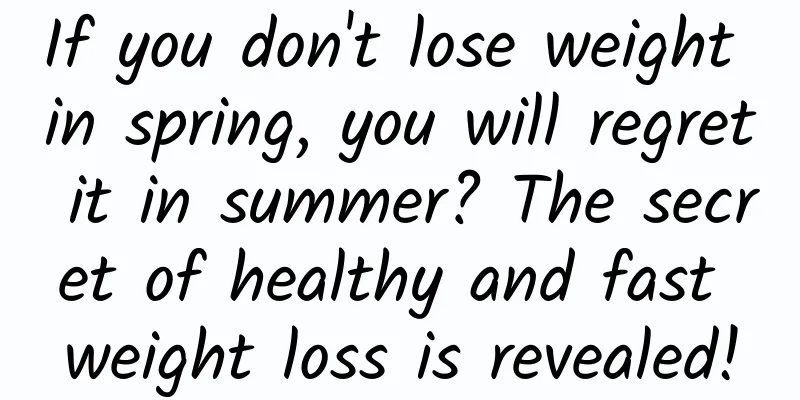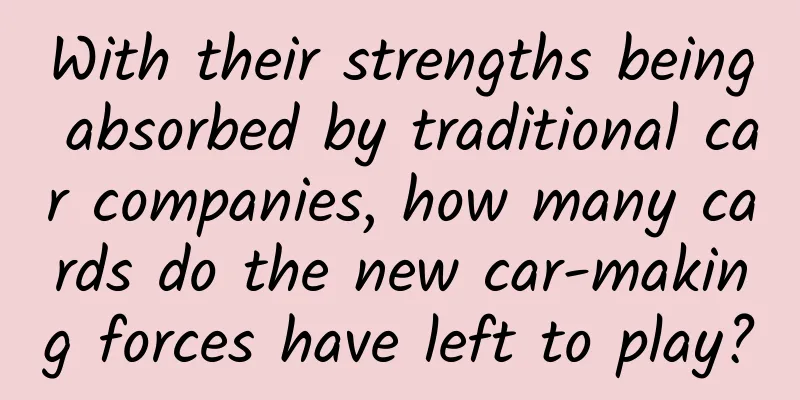If you don't lose weight in spring, you will regret it in summer? The secret of healthy and fast weight loss is revealed!

|
Review expert: Peng Guoqiu, deputy chief physician of the Fourth Medical Center of the General Hospital of the Chinese People's Liberation Army "If you don't lose weight in spring, you will regret it in summer" Losing weight has become the main theme for many people year after year, and they fight against their weight every day. However, there are many people who have put in sweat and effort but have not succeeded in losing weight, and even go against their health. This is closely related to the many wrong weight loss methods and concepts circulating on the Internet. In recent years, many celebrities and Internet celebrities have posted weight loss methods and diet recipes on social media, and many businesses have spread weight loss anxiety, constantly triggering a weight loss craze. How to judge whether you need to lose weight? How to lose weight healthily? How to exercise and eat during weight loss? There are many questions here. Please lose weight scientifically <br /> Currently, most people are trapped in a weight loss cycle, feeling that they are always fat, and become anxious every time they see the number on the scale. But do you really need to lose weight? Before you start losing weight, let's first understand some relevant indicators! BMI The so-called BMI, or body mass index, is an important standard commonly used internationally to measure the degree of human obesity. BMI can effectively judge a person's health and nutritional status. The calculation method of BMI is: BMI = weight (kg) / height (m)². If BMI>24kg/m², it is overweight, and BMI>28kg/m² is obese, in which case you need to lose weight; 18.5≤BMI<24 is a healthy weight and does not require weight loss. BMI comparison table source: Shenzhen Luohu Disease Control Center Body fat percentage The body fat percentage of normal adults is 15%-18% for men and 25%-28% for women. Generally, the body fat content of normal men is 10%-20%, and the body fat content of normal women is 20%-30%. If you have too much fat, you definitely need to lose weight. However, some people are heavy but have a lot of muscles. In this case, they do not need to lose weight. Therefore, being heavy does not necessarily mean being fat. High body fat is the real "fat". Waist, hip, waist-to-hip ratio Waist-to-hip ratio is the ratio between waist circumference and hip circumference. It is a simple indicator of body fat distribution and the degree of fat accumulation in the abdomen. It is highly correlated with visceral fat. Waist-to-hip ratio = waist circumference ÷ hip circumference. The smaller the ratio, the healthier it is. The standard waist-to-hip ratio is <0.8 for men and <0.7 for women. In my country, men >0.9 and women >0.8 are called central (or visceral, intra-abdominal) obesity. After understanding the relevant indicators of weight loss, can you lose weight blindly? No! Not everyone needs to lose weight, and not everyone can lose weight at all times! Teenagers. Especially for those in primary school and middle school, it is normal to be overweight or fat in the early and pre-pubertal development, which is beneficial to the development of puberty. Some teenagers, especially those in middle school and high school, pay too much attention to their weight and lose weight without thinking, which leads to body shape deviation, physical deviation and low body fat percentage, which is not worth the loss. Women of childbearing age. The childbearing age is a special period for women. If they are underweight, they may have difficulty getting pregnant or may suffer miscarriage. Therefore, women of childbearing age should maintain a certain body fat percentage, preferably around 20%-30%. Lose weight by dieting? Lose weight by exercising? To lose weight, you must consume fewer calories than you burn, which is called creating a "calorie deficit." So, how do we burn calories? The simplest answer is to exercise more. However, once you eat, you consume calories. For example, jogging for one hour consumes about 600 kcal of energy, and 600 kcal is actually a bag of French fries. For another example, a person of average build jogs on a treadmill at a constant speed for 30 minutes, and the calories consumed are the same as the calories in a can of Coke. If you eat a few more bites of food, you can make up for the calories you have consumed. Calorie gap diagram Source: Huawei Sports Health At this time, how can we create a "calorie gap"? The answer is: control your diet. For people who want to lose weight but cannot control their diet, eating a bag of French fries may only take 3 minutes, but it takes 1 hour to consume them. Judging from this efficiency, if you really want to lose weight, you should try to control your diet. How to eat to lose weight? Recently, the "Harvard Diet" and "Copenhagen Diet" have become popular on the Internet. These diets, let alone whether you can stick to them, will cause a lot of harm to your body even if you stick to them. Although these diets can help you lose weight quickly in the short term, blindly rejecting carbohydrates can easily cause side effects, including hair loss, constipation, irregular menstruation in women, fatigue, headaches, nausea, lack of concentration, and rough skin. So, how can we eat healthily to lose weight? Well, the country has taken action! The National Health Commission has formulated the "Dietary Guidelines for Adult Obesity (2024 Edition)" to teach you how to lose weight healthily. First, you need to know how much you eat every day. Source: "Dietary Guidelines for Adult Obesity (2024 Edition)" Based on the daily energy requirements of different groups of people, we can recommend an average reduction of 30% to 50% or 500 to 1000 kcal in daily energy intake, or recommend a balanced energy-limited diet with a daily energy intake of 1200 to 1500 kcal for men and 1000 to 1200 kcal for women. The energy supply ratios of the three major macronutrients are: 20% to 30% fat, 15% to 20% protein, and 50% to 60% carbohydrates; the recommended energy supply ratio for breakfast, lunch, and dinner is 3:4:3. Second, know what to eat During the weight loss period, you should eat less high-energy foods such as fried foods, sugary baked goods, candies, and fatty meat (high-energy foods usually refer to foods that provide more than 400kcal/100g of energy), and the daily salt intake should not exceed 5g, cooking oil should not exceed 20-25g, and the intake of added sugar should be controlled below 25g. In addition, alcohol consumption should be limited. Source: "Dietary Guidelines for Adult Obesity (2024 Edition)" "Control your mouth and move your legs", dietary nutrition and physical activity are two important factors affecting obesity prevention and treatment. The guidelines point out that the key to weight loss is 30% exercise and 70% diet. Finally, know how to eat Pay attention to breakfast and do not skip meals. Do not eat dinner too late. It is recommended to eat dinner between 17:00 and 19:00. It is not advisable to eat anything after dinner, but you can drink water. Do not overeat, control the random eating of snacks and drinks, and avoid eating midnight snacks. It is advisable to chew slowly when eating. Slowing down the speed of eating can increase the feeling of fullness and reduce hunger. Appropriately changing the order of meals and eating in the order of "vegetables - meat - staple food" can help reduce the intake of high-energy food. Other weight loss tips? Get a good night's sleep! How important is it to lose weight? Staying up late, lack of sleep, and irregular work and rest can cause endocrine disorders, abnormal fat metabolism, and lead to "overwork obesity". Obese patients should follow the circadian biological rhythm and ensure about 7 hours of sleep per day. It is recommended to go to bed before 23:00. Do some exercise! Insufficient or lack of physical activity and a sedentary lifestyle are important causes of obesity. The principle of exercise for obese patients to lose weight is to mainly do low- to moderate-intensity aerobic exercise, supplemented by resistance exercise. Perform 150 to 300 minutes of moderate-intensity aerobic exercise every week, 5 to 7 days a week, at least once every other day, and resistance exercise 2 to 3 days a week, once every other day, 10 to 20 minutes each time, and consume 2000 kcal or more of energy through exercise every week. Sit less! In addition, the time spent sitting quietly and passively watching videos should be controlled within 2-4 hours a day. For those who sit quietly for a long time or work at a desk, they should get up and move around for 3-5 minutes every hour. Losing weight should be gradual. The ideal weight loss goal should be to reduce 5%-10% of the current body weight within 6 months. The reasonable weight loss rate is to lose 2-4kg per month. Losing weight is not a joke. It is not advisable to be quick and easy to achieve quick results by harming the body. Develop a good diet and exercise actively to achieve healthy weight loss! |
Recommend
Read Stepdaughter novels for free, and read the complete Stepdaughter collection with a warm and smiling spring!
The latest chapter of the Stepdaughter novel TXT ...
This disease cannot be inherited from parents, they look basically the same! Just because...
Expert of this article: Dong Xiaoli, Director of ...
Where are the future opportunities in China's social field?
Recently, advertisements for a social APP have be...
A complete short video operation plan
When a team operates a short video account, they ...
5 Growth Hackers Behind Explosive App Marketing
Facebook acquired MSQRD (Masquerade), a special p...
How much does it cost to develop a luggage mini program in Alar?
WeChat Mini Program is an application that users ...
What are the detailed costs for developing online activity mini-program functions and interactive activity mini-programs?
Nowadays, various activities emerge in an endless ...
Sony to slash staff: Will halve smartphone business staff by March next year
Another tech giant is laying off employees! Accor...
[Case] With the right copywriting, CTR increased 6.3 times!
As the saying goes: Creativity comes from inspira...
Nissan China: Dongfeng Nissan's cumulative sales from January to July 2022 were 535,280 vehicles
Among Japanese luxury brands, apart from Toyota&#...
Intel Financial Report: Intel's total revenue will drop to $47.7 billion in 2023
Recently, Intel announced that the company's ...
Niu Electric's financial report: Niu Electric's revenue in Q3 2022 was 1.15 billion yuan, down 6% year-on-year
Niu Electric today released its third-quarter 202...
How to create video account content? What does a viral video look like?
As a new force in the short video field, WeChat V...
What should I do if wasps build nests in my home in summer?
The thin-waisted wasp is a general term for insec...
Apple lacks innovation capabilities. Didn’t Cook inherit the essence from Jobs?
During the Steve Jobs era, Apple phones have alwa...









